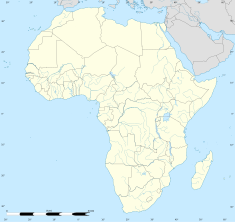Jebba Hydroelectric Power Station
| Jebba Hydroelectric Power Station | |
|---|---|
 | |
| Country | Nigeria |
| Location | Kwara State/Niger State |
| Coordinates | 09°08′08″N 04°47′16″E / 9.13556°N 4.78778°E |
| Purpose | Power |
| Status | Operational |
| Opening date | 13 April 1985 |
| Owner(s) | Federal Government of Nigeria |
| Operator(s) | Mainstream Energy |
| Dam and spillways | |
| Impounds | Niger River |
| Operator(s) | Mainstream Energy |
| Commission date | 13 April 1985 |
| Turbines | 6 x 96.4 MW |
| Installed capacity | 578.4 megawatts (775,600 hp) |
The Jebba Hydroelectric Power Station, also Jebba Power Station, is a hydroelectric power plant across the Niger River in Nigeria. It has a power generating capacity of 578.4 megawatts, enough to power over 364,000 homes. The plant was commissioned on 13 April 1985, although commercial energy production began in 1983.[1]
Location
[edit]The Jebba Power Station is located about 100 kilometres (62 mi) downstream of the Kainji Dam,[1] and approximately 40 kilometres (25 mi) southwest of Mokwa, the nearest urban centre.[2]
This is approximately 256 kilometres (159 mi) by road, southwest of Minna, the capital of Niger State.[3] The power station sits astride the Niger River at the border between Niger State and Kwara State, approximately 91.5 kilometres (57 mi), by road, northeast of Ilorin, the capital city of Kwara State.[4] Jebba Dam sits at an elevation of 71.917 metres (236 ft) above mean sea level.[5]
Overview
[edit]The power station, owned by the Federal Government of Nigeria comprises six generation turbines, each with a rated capacity of 96.4 megawatts, for a maximum installed output of 578.4 megawatts. The concession agreement for operations and maintenance at this power station is held by Mainstream Energy Solutions Limited, an independent power company. Mainstream Energy also holds the concession on the 760 megawatts Kainji Hydroelectric Power Station, located about 100 kilometres (62 mi). upstream of Jebba Power Station.[1] Five of the generation units are available, as of January 2021. The sixth generation unit is inoperable, since it was damaged by a fire in April 2009.[6]
Repairs and renovation
[edit]In January 2021, Andritz AG, an Austrian engineering conglomerate, was selected by Mainstream Energy to repair the defective turbine and restore to power station to maximum capacity.
The electrical-mechanical works include: (a) replacement of the 96.4 megawatts turbine (b) installation of a new 103MVA generator (c) installation of a new transformer (d) installation of a new outdoor switchyard and (e) replacement of accessory equipment, including the intake gate.[6][7]
The repairs and renovations are expected to cost approximately NGN13.68 billion (US$36 million or €30million). Renovation work is expected to last until the first quarter of 2024.[6][7]
References
[edit]- ^ a b c International Hydropower Association (December 2020). "Our Member Organizations: Mainstream Energy Solutions Limited: Brief overview of the Kainji and Jebba Hydroelectric Power Plants: Jebba Hydroelectric Plant". London, United Kingdom: International Hydropower Association. Retrieved 30 January 2021.
- ^ "Travel Distance Between Mokwa Local Government Secretariat And Jebba Dam, Nigeria" (Map). Google Maps. Retrieved 30 January 2021.
- ^ "Road Distance Between Minna, Niger State, Nigeria And Jebba Dam, Nigeria" (Map). Google Maps. Retrieved 30 January 2021.
- ^ "Road Distance Between Ilorin, Nigeria And Jebba Dam, Nigeria" (Map). Google Maps. Retrieved 30 January 2021.
- ^ Olushola S.O. and Ehigiator–Irughe R. (1 March 2017). "Bathymetric and Volumetric Analysis of Jebba (Hydropower) Dam Harnessing its Capability for Multipurpose Use: Geographical Location of the Study Area". Nigerian Journal of Environmental Sciences and Technology. 1: 111–122. doi:10.36263/NIJEST.2017.01.0028. S2CID 202173933.
- ^ a b c ESI Africa (26 January 2021). "Plans afoot to modernise generation unit at Nigerian hydro plant". Rondebosch, South Africa: ESI Africa. Retrieved 30 January 2021.
- ^ a b Chika Izuora (28 January 2021). "Jebba Hydroelectric Power Plant To Gulp N13.68bn". Leadership Nigeria. Abuja. Retrieved 30 January 2021.
External links
[edit]- Generating unit undergoing rehab at Jebba hydro plant, further work planned As of 11 December 2020.



